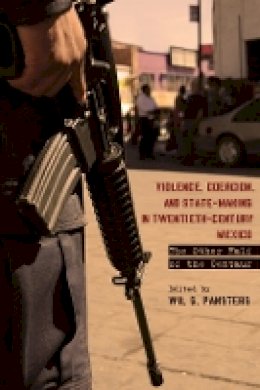
Stock image for illustration purposes only - book cover, edition or condition may vary.
Violence, Coercion, and State-Making in Twentieth-Century Mexico: The Other Half of the Centaur
Pansters
€ 102.63
FREE Delivery in Ireland
Description for Violence, Coercion, and State-Making in Twentieth-Century Mexico: The Other Half of the Centaur
Hardback. Violence in Mexico is not the result of state failure, but of the nature of state-making itself. Editor(s): Pansters, Wil G. Num Pages: 400 pages, black & white illustrations, black & white tables, figures. BIC Classification: 1KLCM; HBJK; JPWL. Category: (G) General (US: Trade). Dimension: 160 x 237 x 27. Weight in Grams: 650.
Mexico is currently undergoing a crisis of violence and insecurity that poses serious threats to democratic transition and rule of law. This is the first book to put these developments in the context of post-revolutionary state-making in Mexico and to show that violence in Mexico is not the result of state failure, but of state-making. While most accounts of politics and the state in recent decades have emphasized processes of transition, institutional conflict resolution, and neo-liberal reform, this volume lays out the increasingly important role of violence and coercion by a range of state and non-state armed actors. Moreover, by ... Read more
Show LessProduct Details
Format
Hardback
Publication date
2012
Publisher
Stanford University Press United States
Number of pages
400
Condition
New
Number of Pages
400
Place of Publication
Palo Alto, United States
ISBN
9780804781589
SKU
V9780804781589
Shipping Time
Usually ships in 7 to 11 working days
Ref
99-1
About Pansters
Wil G. Pansters is Professor of Latin American Studies and Director of the Mexican Studies Centre at the University of Groningen. He is also Associate Professor of Cultural Anthropology at Utrecht University.
Reviews for Violence, Coercion, and State-Making in Twentieth-Century Mexico: The Other Half of the Centaur
"This book, with its eleven well-integrated chapters, brings significant insight into various aspects of state-making in Mexico. It convincingly shows that the recent violence does not represent a sudden break with the past, but instead fits within post-revolutionary state-making. This book is not only useful for those studying Mexico, but can also be recommended to anyone interested in the background ... Read more
